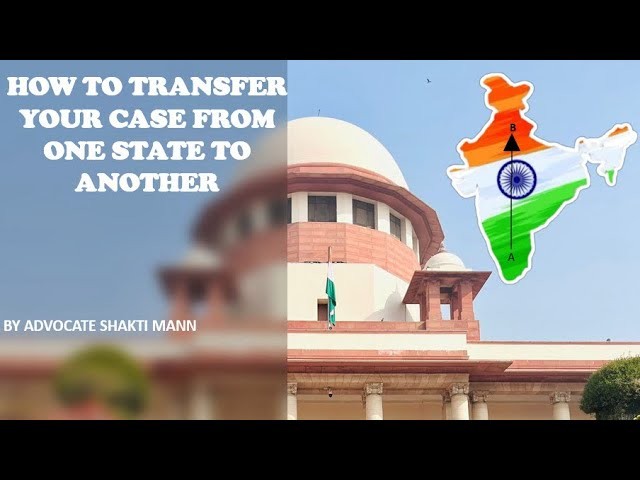
Introduction
Because parties who are facing injustice, any kind of hindrances, inconveniences or obstacles in the route of getting justice in their court proceedings, the court of the district judge, Hon’ble High Court of the state and Hon’ble Supreme Court of India have the inherent power of transferring the proceeding of the case from one court to another, one district to another and one state to another and to transfer the case the aggrieved party has to file a transfer petition before the competent court of law.
What types of cases can be transferred?
There are two types of cases which are entertained by the courts of India these are Civil cases and Criminal cases. Civil as well as criminal cases can be transferred from one court to another in the same district court, one district to another within in same state and one state to another within the territorial jurisdiction of India.
Meaning of Transfer Petition
Transfer petitioner is a petition filed by an aggrieved party before the competent court of law, seeking to transfer their case, which can be civil or criminal. The party can file a transfer petition transfer of their case at any stage of trial.
Grounds are Considered while dealing with the transfer petition/ application:
-
-
If the Judge or Magistrate is personally interested in the case,
-
-
-
If he is connected with one or the other party to the case by relationship, friendship, etc.
-
-
-
If likely to be partial.
-
-
-
If he has already formed or expressed an opinion on the subject matter of the enquiry or trial.
-
-
-
If he has conducted himself in such a manner that no fair or impartial enquiry or trial can be expected from him.
-
-
-
Convenience of parties, the convenience of the wife has to be seen more while transferring a petition to a different court in matrimonial disputes it was observed by Hon’ble Delhi High Court in the case of SMT. SARITA JOSHI v. RAVINDRA BHUSHAN JOSHI 2022 LiveLaw (Del) 1014
-
-
-
Interest of Justice, etc.
-
Transfer petition in District Court
When an aggrieved person seeks to transfer their criminal case to another court, they must file a formal transfer application under section 408 of Cr.P.C. before the Session Judge, presenting compelling reasons or grounds for the transfer. These grounds typically include concerns about impartiality, safety, convenience, or fairness in the current court where the case is being heard. For instance, if the aggrieved person believes that the current court may not provide a fair trial due to potential bias or if there are safety concerns for the parties involved, a transfer application would outline these specific reasons. Additionally, issues related to the convenience of witnesses, legal representatives, or logistical challenges may also be cited as grounds for transfer. To transfer the civil suit or appeal aggrieved person must file a transfer petition under section 24 r/w Order 41 Rule 1 of C.P.C.
Transfer petition in High Court
When an aggrieved person seeks to transfer their criminal case to another District court within one state, they must file a formal transfer petition under section 407 of Cr.P.C. before the Hon’ble High Court, presenting compelling reasons or grounds for the transfer. These grounds are mentioned above. To transfer the civil suit or appeal, the aggrieved person must file a transfer petition under section 24 r/w Order 41 Rule 1 of C.P.C.
Transfer petition in Supreme Court of India
When an aggrieved person seeks to transfer their criminal case to another state within the territorial jurisdiction of India, they must file a formal transfer application under section 406 of Cr.P.C. before the Supreme Court of India, presenting compelling reasons or grounds for the transfer. To transfer the civil suit aggrieved person must file a transfer petition under section 25 of C.P.C.
Procedure and documentation
-
-
Filing Transfer Petition: The application should be made in writing to the concerned court. the grounds for seeking transfer should be clearly mentioned in the transfer petitioner. The application should also include supporting affidavits and evidence to prove your case.
-
-
-
Grounds for Transfer: The grounds are mentioned above, there are some additional grounds such as the medical situation of the aggrieved person, a medical situation in the family, and the person’s unable to appear before the court because of distance etc.
-
-
-
Issue Notice: After the filing of the petition the concerned court issues notice to the opposite party. The opposite party came up with their counter-affidavit, if any.
-
-
-
Arguments: After issuing notice to the other party, the other party will appear before the Hon’ble Court and both parties will present their arguments. The parties can also submit written arguments, if any.
-
-
-
Decision: After considering arguments of the both parties the court will decide whether the matter should be transferred or not. The decision of the Hon’ble Court is based on the interest of justice and fair trial and convenience.
-
-
-
Execution: if the transfer petition is allowed then a notice to the court of both courts, in which the matter is transferred and in which form the matter is transferred.
-
